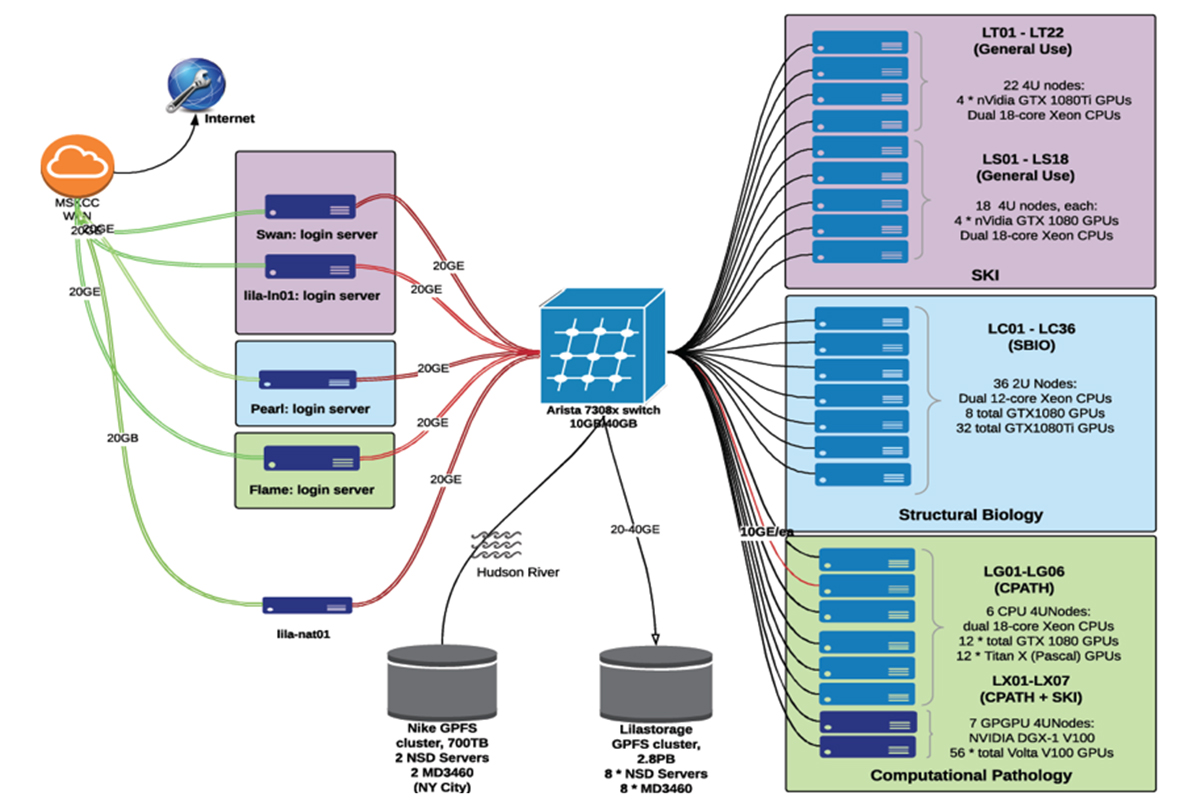Computation Resources
General Computing Environment
All offices in the Department of Medical Physics are equipped with Intel-based multicore computers running Windows 10. Available software includes Microsoft Office and specialized tasks (e.g., MATLAB, Origin, Adobe Photoshop, image display and fusion, Exxim Cobra cone-beam CT reconstruction). A centralized data center provides network shared storage; database, email and ftp utilities; and online access to MSK library collections and e-journals. WebEx scheduling capabilities are available within MSK and with outside institutions. Numerous high-performance multicore computers are available throughout the Department of Medical Physics for research and development. Software development tools include code development (MS Visual Studio 2012 Professional), software project life cycle management and version control (Team Foundation Server), coding assistance (Visual Assist X), software test automation (FX), enterprise database (MS SQL Server), and libraries of speed-optimized algorithms (Intel IPP). Varian Eclipse treatment planning systems are available with extensive scripting applications programming interface to a research dedicated Eclipse system (version 13.6).
Specialized Software: Computational Environment for Radiological Research (CERR)
The key specialized software available for this grant is CERR, our open-source research treatment planning system that has unique tools for treatment plan reviewing, analysis, and data extraction. CERR, comprising 100,000 lines of computer code, is used by hundreds of researchers worldwide, has been cited over 400 times in the peer-reviewed literature, and has been partially supported by several federally funded grants. Other software written on other platforms, e.g., Python, C++, R, MATLAB, may be easily integrated with CERR, making it widely applicable to the general cancer research and clinical communities. CERR is under constant development by our group.
High Performance Computing (HPC) and Graphical Processing Units (GPUs)
MSK has outstanding HPC resources, professionally administered at a dedicated data center. The HPC group maintains a wide-range of computational resources to fit any user needs. In the last several years, the Department of Medical Physics has purchased 4 dedicated HPC server nodes with 16 high-performance GPUs. We have access to 90 other compute nodes on a shared basis with other departments. All HPC nodes are Linux computer clusters that are attached to large storage platforms to support intensive data research. This system allows users to submit complex jobs for the cluster to compute in parallel from a terminal with SSH access. This system is composed of multiple individual computing nodes/servers that are linked to each other and several data storage facilities. Software resources include commercial and academic software used in the analysis of sequences, structures, gene expression profiles, and pathways. Available software and computer languages include, but are not limited to: MATLAB, R, Python, ImageMagick, ImageJ, MySQL, MongoDB, Docker, Ruby, Java, and Perl.

High performance computing at MSK
HPC Cloud
If needed, MSK can obtain access to Amazon cloud services that fit within all MSK Information System policy guidelines. These services will be facilitated through the Amazon Web Console via the “Service Catalog”. Users will be presented with a simple interface enabling the creation of virtual services. Initial portfolio items in the service catalog will include the ability to create virtual servers.
Medical Physics Computer Service
In addition to Center-wide IT support, the Department of Medical Physics has faculty and staff that support medical imaging research and development. The Medical Physics Computer Service consists of two faculty physicists, 8 computer programmers and 4 LAN administrators who develop and support software systems for radiation treatment planning and verification, (3D rigid and nonrigid) image registration, and segmentation. These systems are used in clinical and research activities by the Departments of Medical Physics and Radiation Oncology. A 3D radiation treatment planning system, developed at MSK, is used clinically and in research for planning IMRT, VMAT, 3D conformal, and conventional treatments. Treatment verification software tools include a patient internal motion monitoring system by means of automated tracking of implanted fiducials detected in 2D image sequences during radiation treatment. There is a hospital-wide radiology PACS system and multiple PACS viewing stations as well as more than 20 nuclear medicine workstations, allowing image reconstruction, image registration, fusion, manipulation, and region of interest analysis.
SPI Dedicated hardware on MSK High Performance Computing Specifications
2x Intel Xeon E5-2697 v4 processors; 18-core, 2.3GHz
512GB RAM (16x 32GB DDR4 2400)
1x 1TB SATA HDD; enterprise grade
1x 150GB SATA SSD (OS)
1x 2TB NVMe SSD (Add in card form factor); P4600
1x ConnectX-4 25GBE Dual Port PCI Express 3.0 x8 Network
Interface Card
4x GTX-1080 Ti GPUs
Dedicated Medical Physics Computer Servers
A high-performance computer Linux OS server with 8-sockets (120 cores) and 1TB memory and 2 Tesla K40 GPUs each with 2880 cores and 12GB memory.
Scanners and Printers
Scanners
The CT scanners we have:
- GE HD750 64 Slice
- GE Revolution 64 Slice
- Phillips Big Bore Brilliance CT Simulator 16 Slice
3D Printers
Stratasys Connex 3 Object 260